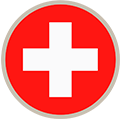This tax guide provides an overview of the indirect tax system and rules to be aware of for doing business in Switzerland.
| Indirect tax snapshot | |
|---|---|
|
What are the current rate(s) of indirect tax?
|
|
|
Are there any confirmed or anticipated changes to these rates?
|
The rates are valid as from 1 January 2024.
|
|
What is the principal indirect tax?
|
Value Added Tax (VAT) is the principal indirect tax in Switzerland. It is a tax on consumer expenditure which is collected on business transactions and imports.
|
|
Is there a registration limit for the tax?
|
Yes. It relates to the annual worldwide turnover of taxable transactions, and once the limit has (or will be) reached it is necessary to register, provided generally taxable supplies with place Switzerland are made at all.
|
|
Does the same registration limit apply to non-established businesses?
|
Yes. There is generally the same registration limit for businesses that are not established in Switzerland.
|
|
Does a non-established person need to appoint a fiscal representative in order to register?
|
Yes, a non-established person will be required to appoint a fiscal representative in order to be able to register for VAT purposes in Switzerland.
|
|
How often do returns have to be submitted?
|
VAT returns are generally to be submitted on a quarterly basis. If certain conditions are met, returns can also be submitted on a monthly basis or semi-annual.
|
|
Are penalties imposed for the late submission of returns/payment of tax?
|
Generally, no penalties are imposed if a VAT return is submitted late. However, interest for late payment (currently 4.5% p.a.) will be levied on late payment on the VAT amount due.
|
|
Are any other declarations required?
|
The submission of an additional annual reconciliation VAT return is required in case deviations, between the VAT returns submitted and the annual financial statements, are detected.
|
|
Are penalties imposed in other circumstances?
|
Penalties may generally be imposed in the case of negligent tax evasion, unjustified exoneration or refund.
|
|
Can the tax incurred by overseas businesses be claimed if they are not registered in your country?
|
Yes, in certain circumstances and subject to certain conditions.
|
Please click on each section to expand further:
Contact us
For further information on indirect tax in Switzerland please contact:

Dr. Matthias Hofer
T +41 43 960 71 43
E matthias.hofer@ch.gt.com

